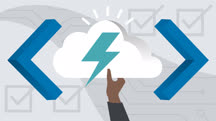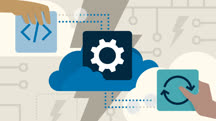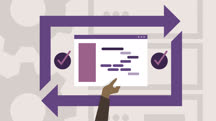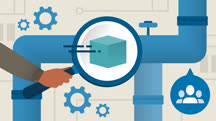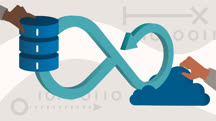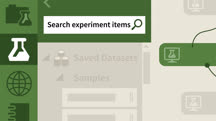Course catalog
Categories
Showing 261-280 of 3,070 items.
Azure for Developers: API Management
Explore the features available in Azure API Management. Learn how to set up and publish a robust set of APIs, taking into account implications for security, performance, and more.
Azure for Developers: Cosmos DB
Get up and running with Azure Cosmos DB, the fully managed database service from Microsoft. Learn about the service's APIs, architecture, configuration options, and more.
Azure for Developers: Implementing and Developing Functions
Get an overview of Azure Functions—an event-driven, serverless compute platform—and review scenarios for integration with other Azure cloud services.
Azure for Developers: Implementing VMs and Batch Jobs
Discover how to deploy virtual machines on Azure and implement batch jobs using Azure Batch services. This course can also help you prepare for the Microsoft AZ-203 exam.
Azure for Developers: Introduction to the Microsoft Identity Platform
Get up and running with the Microsoft Identity Platform. This course steps through the fundamentals of the platform, along with how to use MSAL in C# code.
Azure for Developers: Microsoft Graph Development Using the Microsoft Identity Platform
Get introduced to the Microsoft Graph API and learn how to use the Microsoft Authentication Library (MSAL) to query and manipulate a graph in C# code.
Azure for Developers: Resource Planning
Learn how to evaluate and select the best Azure Storage, compute, networking, and integration options for your project.
Azure for Developers: Security Best Practices
Learn how to secure your apps by leveraging key Azure tools and best practices. This course can also prepare you for the Developing Solutions for Microsoft Azure (AZ-203) exam.
Azure for DevOps: Application Infrastructure
Discover strategies, tools, and processes to manage application infrastructure using the Azure DevOps tool and service set.
Azure for DevOps: Containers
Explore the container-based services in Microsoft Azure, including Azure Container Registry and Azure Kubernetes Service, as you prepare for the Azure for DevOps (AZ-400) exam.
Azure for DevOps: Continuous Feedback
Explore continuous feedback, a key domain in the AZ-400 exam. Learn how to capture and analyze user feedback, route crash report data, track user feedback, and more.
Azure for DevOps: Continuous Integration
Take a deep dive into the subject of continuous integration with Azure DevOps as you prepare for the Microsoft Azure DevOps Solutions (AZ-400) exam.
Azure for DevOps: Dependency Management
Learn how to manage dependencies across multiple projects and teams with Microsoft Azure DevOps services, including Azure Artifacts and Azure Pipelines.
Azure for DevOps: Designing a Strategy
Learn what it takes to design a robust DevOps strategy as you study for the Microsoft Azure DevOps Solutions (AZ-400) exam. This course maps to the Design a DevOps strategy domain.
Azure Functions for Developers
Learn how to use Azure Functions, one of the serverless technologies in Azure, to build robust software solutions on your local computer or in Visual Studio.
Azure Machine Learning Development: 1 Basic Concepts
Developing solutions with Azure Machine Learning? Get started with a clear and concise introduction to machine learning and data science.
Azure Machine Learning Development: 2 Learning ML Studio
Learn how to solve complex data analysis challenges—such as multi-class classification—with machine learning, using Azure ML Studio.
Azure Machine Learning Development: 3 Deploying and Managing Models
Learn how to deploy and manage machine learning models in Azure Machine Learning Studio. Discover how to deploy, scale, and manage your trained models in production scenarios.
Azure Media Services
Build more complex, media-driven applications with Azure Media Services. Explore the Microsoft cloud-based solutions for media encoding, streaming, and intelligent analytics.
Azure Microservices with .NET Core for Developers
Get an overview of the popular microservices architectural pattern, as well as how to use .NET Core 3.1 to create microservices that can be deployed in Azure.


